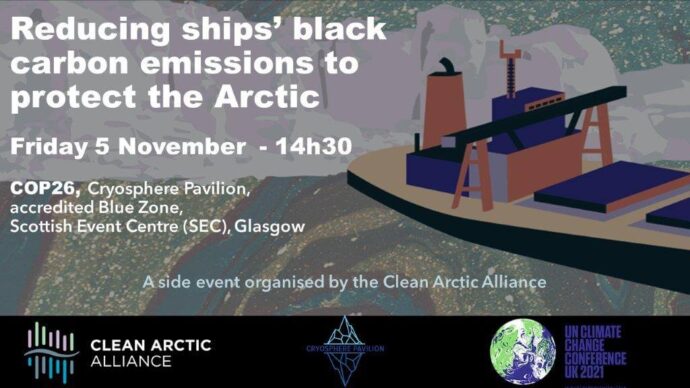COP26 Event: Reducing ships’ black carbon emissions to protect the Arctic – Friday 5th November
Friday 5th November, 14.30 – in the Cryosphere Pavilion (Blue Zone), Scottish Event Centre (SEC), COP26, Glasgow
Speakers will address the Arctic cryosphere crisis, the implications for the people of the Arctic and the planet as a whole, implications for health and the role of shipping in reducing impacts through black carbon reductions.
- Prof. Dirk Notz, University of Hamburg/Max Planck Institute for Meteorology (Virtual): The end of the ice-age?
- Lisa Koperqualuk, Vice President, International Affairs, Inuit Circumpolar Council, Canada: Black Carbon, Snow, and Ice – Impacts in the Arctic and the need for Global Partnerships
- Major Siaosi Kaho on behalf of Her Excellency, Hon. Titilupe Fanetupouvava’u Tu’ivakano, High Commissioner for the Tonga High Commission in London: Coral and Ice: Same World; Same Future!
- Dr Richard Hixson, FRCA FFICM, Consultant in Critical Care and Co-founder NHS Ocean on: Human healthcare and the oceans
- Dr Bryan Comer, Marine Program Lead, International Council on Clean Transportation (Virtual): Black carbon and shipping: Trends and policy options to protect the Arctic and the planet
To attend in person: no registration needed (apart from COP26 UNFCCC accreditation)
Watch video livestream:
Due to a warming climate, major shifts in climate are occurring more strongly and proceeding faster at high latitudes, with the most dramatic changes seen in the sea-ice cover of the Arctic Ocean. Compared to a few decades ago, Arctic summer sea ice cover is much reduced, and the remaining ice is about half as thick. Multi-year ice has declined by around 90%. Days with no summer sea ice could come as soon as the early 2030s, if world leaders fail to fulfil the Paris Climate Agreement’s commitment to limit global heating to less than 1.5C.
As reduced sea ice opens up access to resources, and interest in shorter trans-Arctic shipping routes grows. Despite global efforts, ships’ black carbon (BC) emissions are rising – BC emissions from shipping in the Arctic increased 85% between 2015 and 2019. When black carbon settles onto snow and ice, melting accelerates, and the loss of reflectivity creates a feedback loop exacerbating global heating. Black carbon also has health impacts for local communities. However, reductions in black carbon emissions from shipping in or near the Arctic can be introduced rapidly and have an immediate impact in reducing melting of snow and ice.

